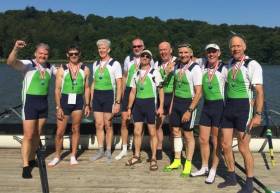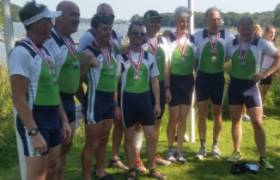Displaying items by tag: Eight
Irish Masters Eight are Afloat Rowers of Month
#Rowing: The Irish eight which won at the World Masters Regatta at Lake Bagsvaerd, Denmark, have been chosen as the Afloat Rowers of the Month for September. There were a number of good results by Irish crews at the event, which is one of the biggest international events of the year. Among the competitors this year was Denmark legend Eskild Ebbesen. The Irish E eight (55 years or older), was drawn from five clubs (Commercial, Belfast Boat Club, Neptune, Old Collegians and Waterford Boat Club) and outpaced German and British rivals in a field of seven crews. They had also won last year at this level. The crew was: John Hudson, Denis Crowley, Gerry Murphy, Mick Heavey, Colin Dickson, Colin Hunter, Fran O’Toole, Donal Mc Guinness and cox Al Penkert.
Rower of the Month awards: The judging panel is made up of Liam Gorman, rowing correspondent of The Irish Times, and David O'Brien, editor of Afloat magazine. Monthly awards for achievements during the year will appear on afloat.ie and the overall national award will be presented to the person or crew who, in the judges' opinion, achieved the most notable results in, or made the most significant contribution to rowing during 2016. Keep a monthly eye on progress and watch our 2016 champions list grow.
Ireland Eight and Pair Win at World Masters Rowing
#Rowing: Ireland had two winners on the first day of the World Masters Rowing Championships in Denmark today. The Ireland composite eight won its race in the E (average age 55 or more) category. They beat German, British, Ukranian, Lithuanian and Turkish crews. The Ireland eight was drawn from Neptune, Commercial, Old Collegians and Belfast Boat Club.
Fran O’Toole and Donal McGuinness, who were part of that crew, won their pairs race in the D category (average age 50 or more).
World Masters Regatta, Copenhagen (Irish interest - Winners; 1,000m)
Men
Eight - E (avg age 55 or more) - Heat Two: Neptune, Commercial, Old Collegians, Belfast Boat Club (J Hudson, D Crowley, G Murphy, M Heavey, D Dickson, C Hunter, F O’Toole, D McGuinness; A Penkert) 3:04.93.
Pair - D (avg age 50 or more) - Heat Three: Commercial (F O’Toole, D McGuinness) 3:26.1.































































